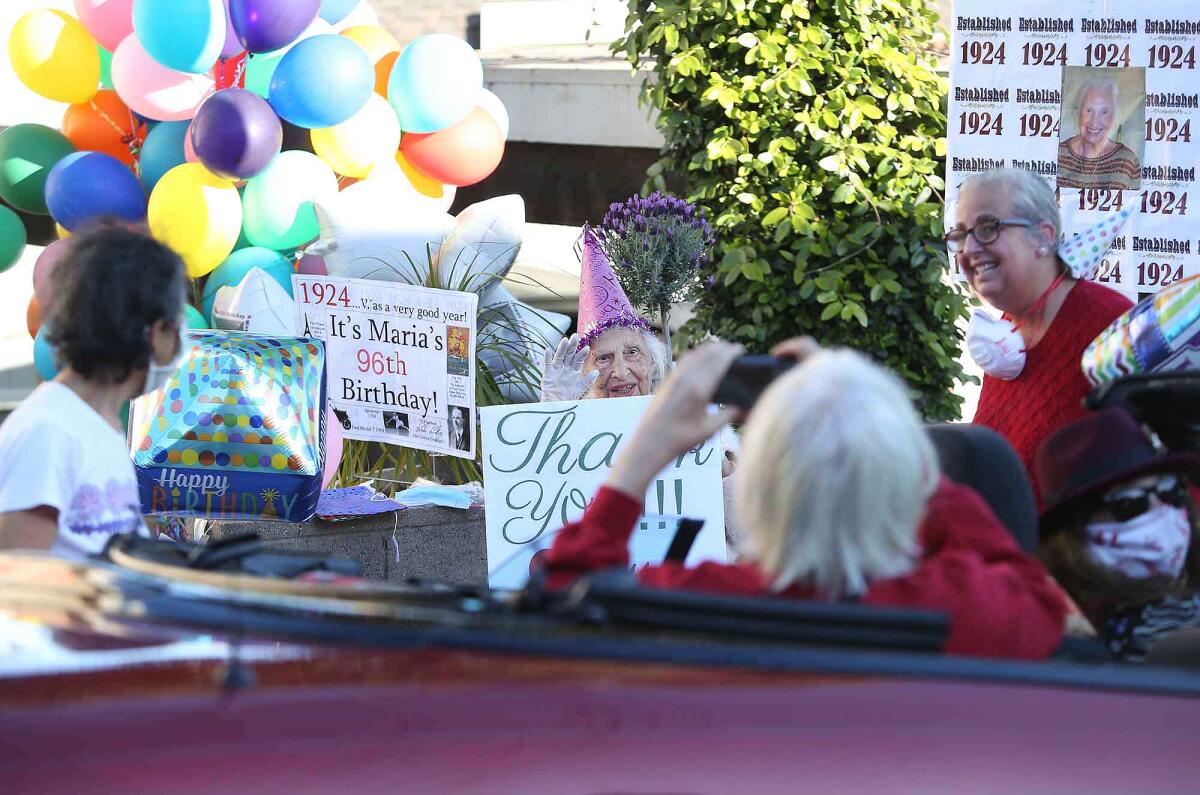Column: How humans are experiencing love in the time of COVID-19

- Share via
With apologies to everyone celebrating Mother’s Day, I relate the distressing history of psychologist Harry Harlow.
In the mid-20th century, Harlow, seeking a deeper understanding of love, conducted a series of infamous experiments on rhesus monkeys.
He removed baby monkeys from their mothers, giving them instead artificial maternal objects made of cloth and wire, and then observed them as they grew. In another series, he subjected monkeys to partial and total isolation for long periods.
The experiments were heavily criticized for their cruelty and questionable ethics, but his findings remain influential to this day, as they demonstrated that touch, comfort, and social interaction are foundations of healthy psychological development.
Now we humans are experiencing love in the time of coronavirus, and some of us might feel a certain kinship with Harlow’s poor, tortured test subjects.
“There’s something about human touch that is crucial” to development and well-being, said Dennis Greenberger, a clinical psychologist and the founder and director of the Anxiety and Depression Center in Newport Beach.
Of course, social and physical distancing isn’t the same as complete isolation. We’re not locked in cages, we’re sheltering in place, and even those of us who are living alone can still say hello to neighbors, go for walks, and communicate with friends and family on digital devices.
Nevertheless, our current circumstances have drastically reduced contact with our sources of strength and comfort — our communities, loved ones, and trusted friends and colleagues.
Grandparents are cautioned not to hug their grandkids, teens aren’t whispering in each other’s ears, and singles can’t meet in person for normal dates. Kids’ birthday celebrations are now drive-by affairs. We eye with suspicion those who break the 6-foot bubble.
Even though many communities are now relaxing some of their shelter-in-place directives, we likely will continue with some level of distancing for the foreseeable future. And if COVID-19 cases surge, as many scientists warn is likely, we could revert to stricter measures.
Which means that people who in are a fragile state due to loneliness and disconnectedness could become even more psychologically stressed.
At the same time, some of those living with several people under one roof might be anxious due to a loss of privacy and an overabundance of togetherness. Worries have been raised about possible increases in domestic violence and substance abuse.
All this added stress also runs the risk of exacerbating medical conditions such as heart disease and dementia, and could lead to developmental delays in young children.
As Greenberger said, “fault lines are going to be exposed.”
Newport Beach psychotherapist Shanna Farmer predicts that “from all these stressors we have now from isolation, we’ll likely see a rise in adjustment disorders,” such as kids who display separation anxiety, depression, or declines in self-esteem.
Even after we emerge from the pandemic, Farmer said, “a lot of people will struggle getting back into cultural norms.”
As dark as all this might seem, the prognosis isn’t totally gloomy. In fact, there is reason to believe that most of us will emerge with our mental health in strong or stable condition.
When researchers studied past periods of intense collective stress such as the post-9/11 trauma, “what was surprising was how resilient people were,” Greenberger said.
He expects that we’ll see a similar bounce back after COVID-19 no longer dominates our lives.
Until then, he said, there are many measures we can take to help us cope.
These include maintaining a daily structure; engaging in meaningful work and activities; expressing gratitude; exhibiting generosity toward others; keeping a journal, and practicing mindful exploration of feelings.
I recently listened to a fascinating interview with Scott Kelly, a veteran of four space flights who spent nearly a year on the International Space Station.
When asked for his advice on enduring isolation, Kelly displayed the plucky grit and common sense one associates with astronauts. He matter-of-factly responded that he found the journal-keeping exercise to be helpful, as well as physical exercise and hobbies.
Focusing on a mission, Kelly said, is paramount, “even if that mission is just to get through this, however long it takes.”
And he recommended letting go of matters over which we have no control.
“Focusing on the things you have control over allows you to make better decisions,” he said.
That message particularly resonates with me at the moment because the newspaper business, like so many others, is undergoing intense financial pressure due to a collapse in advertising revenue.
Some publications have ceased operations, layoffs have ensued, and the journalists who remain employed work tirelessly under difficult conditions to bring you the latest, most accurate reports.
The coronavirus shutdowns have led to devastating losses in advertising revenue to newspapers, including the L.A. Times.
They are like Scott — focusing on the mission, understanding that there are forces beyond their control. Their work is crucial, and I urge you to continue to support them.
My column will be on hiatus for a while. How long, I don’t know. This is one of those moments in history when the future seems even murkier than usual, when recapturing a sense of what we once had, or our dreams about what could be, are receding points on the horizon.
I will not say goodbye, only that I hope to be back soon.
Above all, I do hope, now and always.
All the latest on Orange County from Orange County.
Get our free TimesOC newsletter.
You may occasionally receive promotional content from the Daily Pilot.







